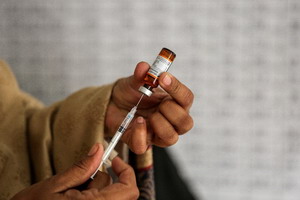 Photo: WHO Pakistan/A. Zaidi15 October 2018 – More than 32 million Pakistani children are to be vaccinated against measles in late October in a countrywide immunization campaign that pulls together national funding and the polio programme’s greatest asset: its human resources.
Photo: WHO Pakistan/A. Zaidi15 October 2018 – More than 32 million Pakistani children are to be vaccinated against measles in late October in a countrywide immunization campaign that pulls together national funding and the polio programme’s greatest asset: its human resources.
From 15 to 27 October, Pakistan’s Expanded Programme on Immunization (EPI) plans to carry out a nationwide measles campaign targeting approximately 31.8 million children aged from 9 to 59 months (and 6 to 83 months in Punjab province). Measles is a highly contagious disease which can be fatal in children, but is preventable with vaccination.
The October measles immunization campaign comes as a response to the ongoing measles outbreak in Pakistan. More than 24 000 suspected measles cases were reported in Pakistan in 2017, and so far this year there have been 30 000 suspected reported cases.
Pakistan typically encounters a measles outbreak every 8 to 10 years, and the Federal Ministry of Health, through the EPI, works proactively to stop these outbreaks with regular vaccination campaigns. Although the Polio Eradication Initiative (PEI) and EPI are separate entities, both work hand in hand on efforts to improve immunization in Pakistan, with the understanding that achieving strong essential immunization coverage is a critical step in bringing Pakistan closer to ending polio, and once this goal is reached, in maintaining polio-free status.
During the upcoming national measles campaign, the polio programme will lend its human, physical and systems resources, knowledge and expertise to the task of achieving highest possible immunization coverage against measles across the country. It’s a good fit: many of the areas at highest risk for polio are also at high risk for measles.
The polio-EPI collaboration has made a real difference in vaccination efforts across dense urban environments as well as scattered rural settings. A key factor in the success of this collaboration is the polio programme’s highly skilled workforce of community vaccinators, frontline health workers and social mobilizers.
During every round of country-wide polio vaccination campaign, around 260 000 frontline health workers work to vaccinate more than 38 million children under the age of 5 across Pakistan. With vital on-the-ground experience in some of the most challenging settings, they are determined to ensure that the lessons learned in polio are transferred to other health interventions.
“Our frontline workers have built strong rapport in their respective communities,” said Dr Rana Safdar, coordinator of the National Emergency Operation Centre for polio eradication and member of the National Measles Steering Committee.
“They understand the dynamics of the population, even as they relate to children, not only at the district level but also at the union council and village level. This indigenous knowledge coupled with community trust can definitely play an instrumental role for other health interventions,” Dr Rana Safdar further elucidated.
Unlike the usual polio eradication activities, measles immunization is not done in door-to-door fashion. It is carried out at fixed centres established at health facilities, as well as outreach sessions conducted at convenient places within community. Children are mobilized to the vaccination sites where highly trained healthcare professionals administer injectable measles vaccine. Despite these differences, the deep local knowledge which polio workers have developed and the foundation of trust they have built with their communities will prove vital in mobilizing caregivers to take their children for measles immunizations at nearby vaccination sites.
“The synergy between the 2 programmes has helped us vaccinate more children. Our joint efforts are geared towards reaching every last child and they have shown significant progress so far. We hope that our synergized efforts during the upcoming measles campaign will lead us to reach every child in the target population with measles vaccine,” said Dr Tahir Abbas Malik, the Pakistan polio programme’s focal person on PEI-EPI Synergy.
It’s not just a one-way street. Synergized efforts have actually helped both programmes make progress towards their goals.
“For polio, these coordinated efforts have paved the way for increasing the coverage of persistently missed children especially those who are on the move or reside in hard-to-reach areas. Similarly, integrated micro planning, monitoring and reporting of children which have not received essential immunization (zero dose) have been instrumental for EPI to achieve gains through enhanced coverage,” said Dr ahir Abbas Malik.
In the wake of the upcoming nationwide measles campaign, the Polio Eradication Initiative has engaged all its staff in high-risk districts which include 23 700 community-based vaccinators, their supervisors and the Union Council-level Polio Officers. An additional 52 Area Coordinators, 200 Polio Eradication Officers, 44 District Health Community Support Officers and 79 District Surveillance Officers will extend their full support to EPI in the measles campaign.
Before the introduction of measles vaccine in 1963 and widespread vaccination, major epidemics occurred approximately every 2–3 years and measles caused an estimated 2.6 million deaths each year across the world. During 2000-2016, measles vaccination prevented an estimated 20.4 million deaths globally, making measles vaccine one of the best buys in public health.
Key facts and figures
- Target population: 31.843 million
- Target age group: from 9 months to 59 months except Punjab province where it is from 6 months to 83 months
- Total doses to administer: 34 230 760
- Campaign days: 12 (excluding Sundays except Khyber Pakhtunkhwa province)
- Workforce: 100 660 personnel across Pakistan




